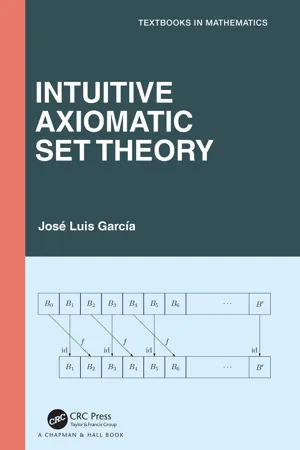
- 362 pages
- English
- ePUB (mobile friendly)
- Available on iOS & Android
Intuitive Axiomatic Set Theory
About this book
Set theory can be rigorously and profitably studied through an intuitive approach, thus independently of formal logic. Nearly every branch of Mathematics depends upon set theory, and thus, knowledge of set theory is of interest to every mathematician. This book is addressed to all mathematicians and tries to convince them that this intuitive approach to axiomatic set theory is not only possible but also valuable.
The book has two parts. The first one presents, from the sole intuition of "collection" and "object", the axiomatic ZFC-theory. Then, we present the basics of the theory: the axioms, well-orderings, ordinals and cardinals are the main subjects of this part. In all, one could say that we give some standard interpretation of set theory, but this standard interpretation results in a multiplicity of universes.
The second part of the book deals with the independence proofs of the continuum hypothesis (CH) and the axiom of choice (AC), and forcing is introduced as a necessary tool, and again the theory is developed intuitively, without the use of formal logic. The independence results belong to the metatheory, as they refer to things that cannot be proved, but the greater part of the arguments leading to the independence results, including forcing, are purely set-theoretic.
The book is self-contained and accessible to beginners in set theory. There are no prerequisites other than some knowledge of elementary mathematics. Full detailed proofs are given for all the results.
Tools to learn more effectively

Saving Books

Keyword Search

Annotating Text

Listen to it instead
Information
Table of contents
- Cover Page
- Half-Title Page
- Series Page
- Title Page
- Copyright Page
- Dedication Page
- Contents
- Preface
- I The Zermelo-Fraenkel Theory
- II Independence Results
- III Appendices
- Bibliography
- Index
Frequently asked questions
- Essential is ideal for learners and professionals who enjoy exploring a wide range of subjects. Access the Essential Library with 800,000+ trusted titles and best-sellers across business, personal growth, and the humanities. Includes unlimited reading time and Standard Read Aloud voice.
- Complete: Perfect for advanced learners and researchers needing full, unrestricted access. Unlock 1.4M+ books across hundreds of subjects, including academic and specialized titles. The Complete Plan also includes advanced features like Premium Read Aloud and Research Assistant.
Please note we cannot support devices running on iOS 13 and Android 7 or earlier. Learn more about using the app